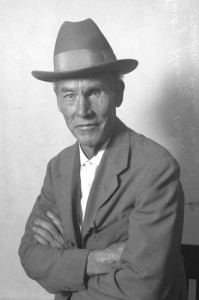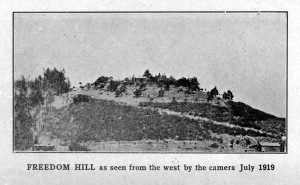Found – a small and very rare book Happy in Hell (Freedom Hill Pressery, Burbank, 1924) by ‘Freedom Hill Henry’ (Dr. Henry Leroy.) He founded a commune in the Shadow Hills district above Burbank which flourished between 1913 and 1930. It was known as Freedom Hill. This small book was limited to 957 copies and printed and bound by the author. He wrote another book called Miserable in Heaven and also a study of Jacob Beilhart of the Spirit Fruit Society, an influence on him. A bit of a joker he has a note at the front: “Dear Comrade: If you like this booklet, lend it to your poor friends and tell your rich friends to buy a copy. If you don’t like it, keep quiet, and consult a specialist on mental diseases. I am an insane specialist and I can readily tell whether any one is just right in his mind. If you agree with my notions, then you are all right. If you don’t agree with me, then I know you are crazier than I am.”
Leroy’s philosophy, if that is not too lofty a word for his ideas, is hinted at in the titles of his books Miserable in Heaven and Happy Hell. He was influenced by Edward Carpenter, Walt Whitman, the Theosophists, Vivekenanda, Martin Luther and even Luther Burbank. It was essentially a loving philosophy aimed at helping people to think for themselves and realize that they could change the way they had always looked at things and to be ‘happy in hell’ (or purgatory.) He writes:
 We are in slavery as long as we can’t get what we want, all that we want, and nothing but what we do want. Do you think we shall ever become skillful enough to get all that we want and nothing but what we do want? Or, in other words, do you think we shall ever become free? If we can’t become skillful enough to get what we want, maybe WE CAN BECOME SIMPLE ENOUGH TO WANT WHAT WE GET, and that would amount to the same thing. In order to do and to get what we please we may have to change our pleases. If we could change our pleases to what we do do, and to what we do get, then our doing and our getting would correspond with our pleases. Then we could say we do as we please and get what we please. It is wonderful how logic can make impossible things easy. The way to do as we please is to be pleased with what we do. The way to get what we want is to want what we get. The way to be free is to be content with our lot. Now I have given you a secret of happiness— a secret worth a million dollars to you if you will take it and use it.
We are in slavery as long as we can’t get what we want, all that we want, and nothing but what we do want. Do you think we shall ever become skillful enough to get all that we want and nothing but what we do want? Or, in other words, do you think we shall ever become free? If we can’t become skillful enough to get what we want, maybe WE CAN BECOME SIMPLE ENOUGH TO WANT WHAT WE GET, and that would amount to the same thing. In order to do and to get what we please we may have to change our pleases. If we could change our pleases to what we do do, and to what we do get, then our doing and our getting would correspond with our pleases. Then we could say we do as we please and get what we please. It is wonderful how logic can make impossible things easy. The way to do as we please is to be pleased with what we do. The way to get what we want is to want what we get. The way to be free is to be content with our lot. Now I have given you a secret of happiness— a secret worth a million dollars to you if you will take it and use it.
It’s not Wittgenestein or even Seneca. He did not expect people to accept what he said and appeared not to be bothered if they did not. He did not care about his reputation- ” I used to have a good reputation back in Indiana. But when I came West I left it behind. It was too much trouble to move it around and pay freight on it…” One chapter of the book is a rant against giving advice and receiving advice (from ‘fond’ friends). –“It is so easy to take advice…the lazy man’s relief. The release of the necessity of thinking; and it is so hard to think. Nature, in order to compel us to think, punishes us severely for not thinking effectively. Every wild animal has to wear its thinking cap night and day in order to capture its food and not be captured…thus nature trains her children to be smart. In civilized life, is so easy to get a job where we will be told what and how to do and thus earn an easy living, quit effective thinking and cease to grow.”
A lot of these ideas appeared much later in the Self- Help and the New Age movement – often without Henry’s humour but with added earnestness. He defined himself as a crank, but a special kind of crank:
On being a crank…
The difficulty is that my friends do not understand that I am a peculiar crank. Nature has made an entirely different set of laws and regulations for me; just for me alone and not applicable to any of you. I am governed by a peculiar mystical system; a system that is invisible, intangible, undemonstratable, unprovable, and unbelievable. I am especially protected by the Gods, so that no harm can come to me. Nothing ever happens to me but what I deserve. I never get stung unless I go too close to a wasp’s nest. I never get sick unless I need to. Nobody is ever unjust to me. Nobody steals anything from me but what I can get along without. I never lose an eye* that I have to have.
*Footnote— Henry Leroy, fairly early in his career, lost an eye, which was replaced by a glass eye which he often joked about.
Did Los Angeles produce any other philosophers? You could put forward eden ahbez, (cue Nat King Cole singing Nature Boy), Raymond Chandler, Charles Bukowski even Aldous Huxley…


Very good rediscovery. The non reliance on advice reminds me of the existentialist particularly Sartre. Other LA philosopers? Try Sam Harris and at a pint Philip K Dick.
It’s funny you mention eden ahbez. Did you happen to see the photo of Freedom Hill Henry’s son from 1924? >>http://wesclark.com/burbank/henrys.html
I used to live at the base of Freedom Hill in today’s Shadow Hills. I first became aware of him while studying another California philosopher (i.e., he lived the last 20 years of his life in CA) named J. William Lloyd who lived at the base of Freedom Hill and was an inspiration to FHH.
Lloyd was corresponding with Aldous Huxley in the 1930s. And amazingly, there seems to be a connection between him and eden ahbez.
LLoyd’s book titled “The Dwellers in Vale Sunrise” published in 1904 was considered to be the first time a hippy group is described in American literature. Laurence Veysey in his 1973 University of Chicago Press book titled “The Communal Experience: Anarchist & Mystical Communities in Twentieth-Century America” writes in Chapter 1 after quoting a passage from Lloyd’s book that: “…one is soon aware of having stumbled into the presence of the very first “hippie” band in the history of the American imagination.” p. 19
I have lots more information on many of these characters, especially Lloyd and Freedom Hill Henry.
Best Regards, BFT
We want to learn more.
Don Ray
donray@donray. com
760-900-1735
Contact me please?
Many thanks Ted– much of my info came from that link + our copy of his excellent book Happy in Hell. I think he would have got on with Sartre and even E Tolle. Thanks for the info on William Lloyd another Los Angeles philosopher. I have a book somewhere called Children of the Sun which links this crowd back to Germany in the late 19th century and groups like the wandervogel– also early hippie types. Stuff in there on eden ahbez and the immortal Gypsy Boots!
Howdy Jot 101
Sorry to take so long to get back to you.
I am familiar with Children of the Sun, but the hippy influence that Lloyd brings to the table is not from Germany, but rather rooted in the American Transcendentalist tradition: Emerson, Thoreau and Whitman.
Freedom Hill Henry was a friend of Lloyd’s and was strongly influenced by J. William Lloyd’s books, especially the Natural Man and Dawn Thought.
BFT
Happy to report that I’ve finally acquired a copy of “Miserable in Heaven” by Freedom Hill Henry!